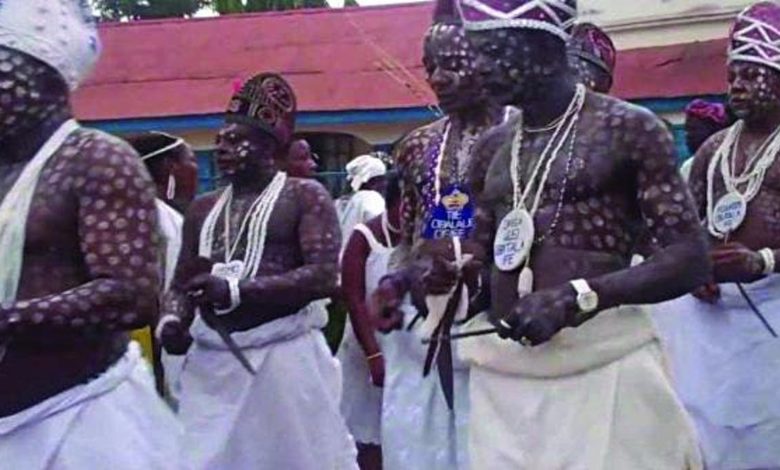Controversy In Southwest Nigeria Over Curfew Declared By Traditionalists
Traditionalists have declared curfew in a part of Ogun state, Southwest Nigeria, to celebrate the Orisa Oba festival, a move other religious adherents have frowned at.

A controversy is brewing in Ipokia Local Government Area of Ogun State, Southwest Nigeria, following a curfew declaration in the area by some traditional worshippers.
The traditionalists reportedly declared the curfew to mark the year’s ‘Orisa Oba’ festival in communities within the local government area, which borders the Benin Republic.
However, Al-Imam Abdulwaliy, an Islamic cleric in the state, has rejected the curfew, warning that it may plunge the community and the state into a religious crisis.
While speaking with HumAngle, Abdulwaliyu recalled that the traditionalists invaded his mosque in 2019 during a similar festival.
Narrating the incident, the Islamic cleric said he was pelted with stones by the Oro worshippers who also destroyed properties in the mosque.
He explained that the incident led to a court case, and stakeholders in the area were made to sign a peace pact to forestall a repeat of such an occurrence.
However, he said the traditionalists had already declared a curfew in Idiroko, Ipokia and few other parts of the state, as this year’s festival is expected to begin on Saturday.
The Islamic cleric said the festival would violate the right to freedom of movement of other people.
He urged the state government, security agencies and other stakeholders to call the traditionalists to order.
“The Oro adherents should restrict their festival to midnight. No religion should deny people their rights to movement and practice of their religion,” he added.
A Court Had Banned Daytime Oro Festival
HumAngle gathered that an Ogun State High Court had banned Oro festival observance in the daytime.
In a judgement delivered in 2018, a High Court sitting in Ipokia Local Government Area declared as illegal the imposition of curfews in the daytime on the people of Ipokia by the Oro cult.
The Christian association and the Muslim community in the area had jointly filed a suit in the court against curfew for the Oro festivals.
The court granted their plea and ruled that the Oro festival could only be carried out between midnight and 4 a.m, subject to the relevant authorities’ approval.
The court noted that the Oro worshippers had no constitutional authority to impose a curfew on residents.
Justice Sikiru Owodunni, who delivered the judgement, ordered the participants to write an undertaking to maintain peace during the festival.
“It remains surprising that Oro/Orisa Oba members in Ipokia Local Government continue to pay a deaf ear to different Peace Agreements reached between Muslims/Christians and traditional adherents in Ipokia,” Abdulwaliy told HumAngle.
Meanwhile, when contacted, Kabiru Abolurin, the Caretaker Chairman of Ipokia local government, said a peace meeting had been called to address the matter on Thursday at the local government secretariat, Ipokia.
He said he was aware that existing court judgments and peace pacts banned Oro/Orisa oba’s daytime rituals in the area.
Abolurin said security agencies had been alerted to ensure the traditionalists abide by the judgment and peace pacts to maintain peace in the state.
The Oro Festival and Consequent Controversies In Southwest
The Southwest region is religiously diverse, with Christians, Muslims and followers of traditional religious beliefs coexisting.
The Oro festival is one of the various traditional festivals celebrated by towns and settlements in the region.
The time and method of its practice vary according to peculiarities in each town or village. While the ritual lasts for days in some places, it is observed for weeks or months in other areas.
While its adherents in some places have adjusted the festival to conform with modern realities, others have stuck to age-long methods.
Meanwhile, what is common and unchanged about the Oro festival is that it is patriarchal. It is only celebrated by male descendants who are paternal natives to the specific locations where the festival is taking place.
Women are prohibited from being outside anywhere, and anytime the Oro ritual is taking place. Any woman who witnesses the ritual is condemned to death.
The festival has resulted in public outbursts and, in some places, clashes between traditional worshippers of Oro and adherents of other religions.
In 2018, the festival attracted condemnation from Lagosians when a traditional ruler announced a curfew for a week in Lagos’ Ikorodu area. Non-natives, especially women, were denied their right to free movement.
In mid-July 1999, there was a major clash between Hausa and Yoruba communities in Sagamu, Ogun state, where people were killed.
As narrated by Human Rights Watch, quoting local reports, the incident occurred during an Oro festival.
Yoruba and Hausa communities had reportedly agreed to respect a traditional night-time curfew usually observed during the festival. However, a Hausa woman was killed by the Oro ritualists because she violated the curfew.
Both ethnic groups living in the area took up arms, and there was a bloody fight.
Over 60 persons were reportedly killed, with casualties on both sides.
Ironically, it is claimed that the Oro festival’s main aim is to maintain peace and order and cleanse the society of evil.
Support Our Journalism
There are millions of ordinary people affected by conflict in Africa whose stories are missing in the mainstream media. HumAngle is determined to tell those challenging and under-reported stories, hoping that the people impacted by these conflicts will find the safety and security they deserve.
To ensure that we continue to provide public service coverage, we have a small favour to ask you. We want you to be part of our journalistic endeavour by contributing a token to us.
Your donation will further promote a robust, free, and independent media.
Donate HereStay Closer To The Stories That Matter




